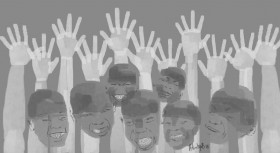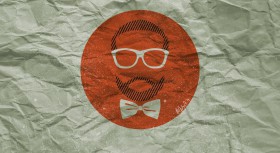In the last few years, I often consider myself a self-proclaimed feminist man, one who has never even read Simone de Beauvoir’s The Second Sex or Rosemarie Tong’s Feminist Thought. To be honest I’ve tended to stay on the cautious side when it comes to calling myself a feminist, because I may not have the quality of being a feminist the way it is defined by some people (as if feminism is an exclusive notion). In my understanding, the definition of feminists (if it really needs a definition) is not that complicated: feminists are people who support and strive for equality and justice for all genders.
Feminism, as a form of critical theory, contains practical dimension. Feminism will die or become useless if it’s only stuck in the realm of text and knowledge, without any concrete implementation. Feminism contains a dimension of clear resistance – against oppression and patriarchal domination. In order to give birth to a society with a just and equal gender relation, feminism as a medium for movement doesn’t want to be a mere narrative filled only with women’s tears and blood. Moreover, feminism wants all those tears and blood not to spill in vain. It wants to end all the suffering so that all people can live together in harmony and equality.
To this day, I feel like I haven’t read enough books about feminism. I get most of my prior knowledge about feminism from the writings in Jurnal Perempuan (Women’s Journal) and some articles I found on the Internet. And I’m still planning to read either The Second Sex or Feminist Thought. So if not from classic theoretical books, how did I learn about feminism? Well, I’ve learned a lot about feminism from practical advocacy and daily lives.
The end of 2013 became the starting point for me to learn more about gender relation issues that later brought me to feminism. At the time, I worked with some of my friends, advocating a sexual abuse case involving poet Sitok Srengege. During the advocacy, I learned many things about women’s place in the face of law that has zero gender perspective. I also learned about trauma and psychological pain that female victims of sexual violence have to go through.
I gained even a broader knowledge during a national symposium committee in my faculty that focused on sexual violence as its main theme. I acquired some concepts, such as body autonomy, nonconsensual sexual relationship, and victim blaming. Additionally, the sexual abuse theme that is a part of a broader problems of women oppression also helps me to understand further about patriarchy, phallocentrism, subordination, and domination. Those experiences have been incredibly enlightening for me.
This semester, I continue my learning and advocacy by joining Women and Children Law Clinic (Klinik Hukum Perempuan dan Anak) in my faculty. It provides me with a good opportunity to learn more and apply what I’ve learned before.
Being born a man, however, makes it hard to completely erase the gender roles, identities, and myths that have deeply planted in me by the patriarchal culture. Though I want to transform myself into a male feminist who is just, misogyny still leaves its traces in my head. Every time I feel like my condescending attitude is emerging, I try my best to deconstruct the thought, preventing it from happening.
Practical feminism for men who are trying to have good awareness of gender equality is a real challenge. He has to always be ready to defeat the potency of misogynistic thoughts and acts in him. This attempt has to be done constantly until the misogynistic doctrine disappear completely from his frame of mind.
To prevent from becoming a misogynist, I try to implement equality and gender justice in my daily lives, not just in my advocacy practice. At micro level, I did public service and domestic work in the family. Helping my mother clean up the house and prepare food turns out to be not that difficult, work that is definitely not just exclusively designed for women. I also try to build a relationship that is fair and equal with my girlfriend. The way I see women has hugely changed. I’m no longer looking at women as objects. I do all of these because I believe that women are not men’s attribute, not a fragile entity; women are equal subjects.
I think these changes are good, not just for myself, but also to others. Now I understand that it’s not that hard to be a man who sees a woman as a complete entity and equal to himself. Though he may face a constant struggle with himself, he definitely can change.
The article is originally written in Indonesian.
Dion Valerian is an undergraduate law student at his final year at the University of Indonesia. He really wishes to graduate next year. If you have time, visit him at www.dionvalerian.com.








Comments